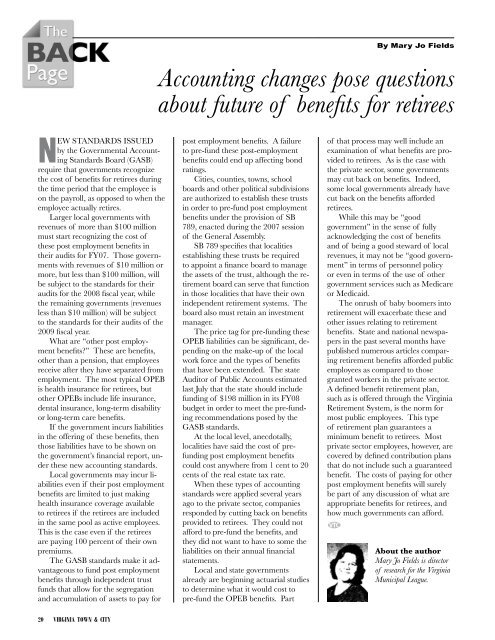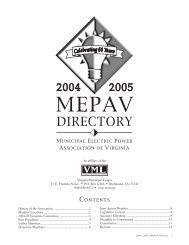VHDA Program Transforming Communities - the Virginia Municipal ...
VHDA Program Transforming Communities - the Virginia Municipal ...
VHDA Program Transforming Communities - the Virginia Municipal ...
- No tags were found...
You also want an ePaper? Increase the reach of your titles
YUMPU automatically turns print PDFs into web optimized ePapers that Google loves.
By Mary Jo FieldsAccounting changes pose questionsabout future of benefits for retireesNew standards issuedby <strong>the</strong> Governmental AccountingStandards Board (GASB)require that governments recognize<strong>the</strong> cost of benefits for retirees during<strong>the</strong> time period that <strong>the</strong> employee ison <strong>the</strong> payroll, as opposed to when <strong>the</strong>employee actually retires.Larger local governments withrevenues of more than $100 millionmust start recognizing <strong>the</strong> cost of<strong>the</strong>se post employment benefits in<strong>the</strong>ir audits for FY07. Those governmentswith revenues of $10 million ormore, but less than $100 million, willbe subject to <strong>the</strong> standards for <strong>the</strong>iraudits for <strong>the</strong> 2008 fiscal year, while<strong>the</strong> remaining governments (revenuesless than $10 million) will be subjectto <strong>the</strong> standards for <strong>the</strong>ir audits of <strong>the</strong>2009 fiscal year.What are “o<strong>the</strong>r post employmentbenefits?” These are benefits,o<strong>the</strong>r than a pension, that employeesreceive after <strong>the</strong>y have separated fromemployment. The most typical OPEBis health insurance for retirees, buto<strong>the</strong>r OPEBs include life insurance,dental insurance, long-term disabilityor long-term care benefits.If <strong>the</strong> government incurs liabilitiesin <strong>the</strong> offering of <strong>the</strong>se benefits, <strong>the</strong>nthose liabilities have to be shown on<strong>the</strong> government’s financial report, under<strong>the</strong>se new accounting standards.Local governments may incur liabilitieseven if <strong>the</strong>ir post employmentbenefits are limited to just makinghealth insurance coverage availableto retirees if <strong>the</strong> retirees are includedin <strong>the</strong> same pool as active employees.This is <strong>the</strong> case even if <strong>the</strong> retireesare paying 100 percent of <strong>the</strong>ir ownpremiums.The GASB standards make it advantageousto fund post employmentbenefits through independent trustfunds that allow for <strong>the</strong> segregationand accumulation of assets to pay forpost employment benefits. A failureto pre-fund <strong>the</strong>se post-employmentbenefits could end up affecting bondratings.Cities, counties, towns, schoolboards and o<strong>the</strong>r political subdivisionsare authorized to establish <strong>the</strong>se trustsin order to pre-fund post employmentbenefits under <strong>the</strong> provision of SB789, enacted during <strong>the</strong> 2007 sessionof <strong>the</strong> General Assembly.SB 789 specifies that localitiesestablishing <strong>the</strong>se trusts be requiredto appoint a finance board to manage<strong>the</strong> assets of <strong>the</strong> trust, although <strong>the</strong> retirementboard can serve that functionin those localities that have <strong>the</strong>ir ownindependent retirement systems. Theboard also must retain an investmentmanager.The price tag for pre-funding <strong>the</strong>seOPEB liabilities can be significant, dependingon <strong>the</strong> make-up of <strong>the</strong> localwork force and <strong>the</strong> types of benefitsthat have been extended. The stateAuditor of Public Accounts estimatedlast July that <strong>the</strong> state should includefunding of $198 million in its FY08budget in order to meet <strong>the</strong> pre-fundingrecommendations posed by <strong>the</strong>GASB standards.At <strong>the</strong> local level, anecdotally,localities have said <strong>the</strong> cost of prefundingpost employment benefitscould cost anywhere from 1 cent to 20cents of <strong>the</strong> real estate tax rate.When <strong>the</strong>se types of accountingstandards were applied several yearsago to <strong>the</strong> private sector, companiesresponded by cutting back on benefitsprovided to retirees. They could notafford to pre-fund <strong>the</strong> benefits, and<strong>the</strong>y did not want to have to some <strong>the</strong>liabilities on <strong>the</strong>ir annual financialstatements.Local and state governmentsalready are beginning actuarial studiesto determine what it would cost topre-fund <strong>the</strong> OPEB benefits. Partof that process may well include anexamination of what benefits are providedto retirees. As is <strong>the</strong> case with<strong>the</strong> private sector, some governmentsmay cut back on benefits. Indeed,some local governments already havecut back on <strong>the</strong> benefits affordedretirees.While this may be “goodgovernment” in <strong>the</strong> sense of fullyacknowledging <strong>the</strong> cost of benefitsand of being a good steward of localrevenues, it may not be “good government”in terms of personnel policyor even in terms of <strong>the</strong> use of o<strong>the</strong>rgovernment services such as Medicareor Medicaid.The onrush of baby boomers intoretirement will exacerbate <strong>the</strong>se ando<strong>the</strong>r issues relating to retirementbenefits. State and national newspapersin <strong>the</strong> past several months havepublished numerous articles comparingretirement benefits afforded publicemployees as compared to thosegranted workers in <strong>the</strong> private sector.A defined benefit retirement plan,such as is offered through <strong>the</strong> <strong>Virginia</strong>Retirement System, is <strong>the</strong> norm formost public employees. This typeof retirement plan guarantees aminimum benefit to retirees. Mostprivate sector employees, however, arecovered by defined contribution plansthat do not include such a guaranteedbenefit. The costs of paying for o<strong>the</strong>rpost employment benefits will surelybe part of any discussion of what areappropriate benefits for retirees, andhow much governments can afford.About <strong>the</strong> authorMary Jo Fields is directorof research for <strong>the</strong> <strong>Virginia</strong><strong>Municipal</strong> League.20 VIRGINIA TOWN & CITY









